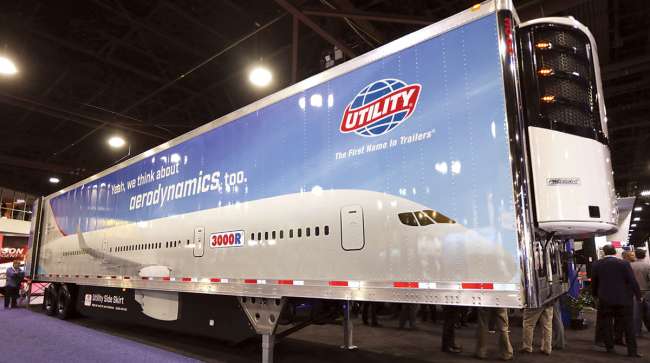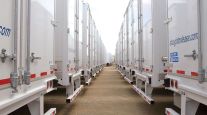Senior Reporter
March Trailer Orders Hit 29,500, More Than Triple a Year Earlier

[Stay on top of transportation news: Get TTNews in your inbox.]
North American net trailer orders for March hit 29,910, more than triple the volume compared with a year earlier at the beginning of the coronavirus pandemic, ACT Research reported.
A year ago in March, orders were 7,595 as the pandemic’s reality became clear.
The volume also was 12% higher than February’s total of 26,414, countering the typical seasonal decline seen in March, according to ACT.
“The March orders were certainly stronger than I might have anticipated. I was thinking things might be settling out a little more,” said Frank Maly, director of commercial vehicle research and analysis at ACT. “But we still built the backlog in March even though we also had a better build rate.”
He said the order board backlog for vans and reefers now reaches into the later part of first-quarter 2022 — with the 9.7 months marking the lengthiest reach since 1994.

Ake
This comes as the build rate posted its first year-over-year gain since April 2019, he said.
Meanwhile, overall cancellations in March were about 3,500, Maly said.
Those spots were filled in very quickly by others, he suggested.
At the same time, he said the past two months have seen “pretty high” cancellations of bulk tank orders — 10% in March and 18% in February.
“So there has been some pretty significant churn in that segment,” he said. “That tells me that maybe some of the things the new administration is talking about from an energy and fueling standpoint may be causing some of those folks in that sector to reassess what their equipment needs are.”
FTR pegged the preliminary orders at 27,400.
Don Ake, vice president of commercial vehicles at FTR, said one reason the order number went up compared with February is that “a few large fleets saw the opportunity to order some dry vans for this year and took advantage of it.”
Another reason was the flatbed and vocational markets have “solid orders” because the manufacturing and industrial sectors are improving.
Ake said flatbed orders over the past five months were more than double what they were in that period a year earlier.
One trailer maker said the economy was closing down last year and is opening up this year.
“So fundamentally March 2020 and March 2021 are the opposite markets in my view,” said Chris Hammond, executive vice president of sales at Great Dane.
“When speaking with our customers we want them to know that we are working on every front to get the equipment built but we like most industries are dealing with a lot of variables outside of our control,” Hammond said. “Our daily focus is to build what we’ve sold as quickly as possible, we do appreciate the understanding many customers have shown us during the past few months.”
Other trailer makers did not respond to a request for comments.
In related news, during the spring meeting of American Trucking Associations’ Technology & Maintenance Council a task force addressed operational issues and spec’ing of reefer trailers. Paul Kroes, strategic insights leader at Thermo King Americas, told the meeting that door switches that shut off a trailer refrigeration unit can have the single biggest impact on runtime reduction.

Even at Level 4 autonomy, self-driving trucks will have technical limitations. In this episode, we ask how technology developers are clearing those hurdles to make autonomous trucking a reality. We bring in Boris Sofman, head of engineering for the autonomous trucking program at Waymo. Hear a snippet above, and get the full program by going to RoadSigns.TTNews.com.
“Running a TRU with the doors open pulls in warm air. Door switches turn the TRU off when the doors are open,” he said.
Also, fleets should check that the trailer refrigeration unit’s engine is operating at the correct revolutions per minute.
“Vibration is one of the No. 1 killers for the unit,” Kroes said. “Whether you are cracking a frame or similar piece of equipment, it is really the internal vibration caused by the engine, typically doing that. So make sure that the engine rpms are within specifications. And you should do that every preventive maintenance schedule.”
Also, when ordering a refrigerated trailer, incorporating a metallic foil into trailer liner creates an impermeable layer to virtually eliminate the possibility of water getting in, said Tim Schmeits, director of engineering at Everest SS [model trailer] at Great Dane.
“Not only is this important on the interior of the trailer but also on the floor of the trailer to protect against splash and spray,” he said. “Such a liner also significantly reduces the escape of the blowing agent gas from the cell structure of the insulating foam — and that extends the life of the trailer and the life of the cooling unit.”
Hammond said Great Dane was seeing fleets gravitate toward smarter trailers both on new builds and with retrofits.
“That’s been good news for our FleetPulse PRO [telematics] units on new and our FleetPulse GO unit for existing trailers. Customers want to know where the trailers are, know if the trailer is healthy and ready to roll and they want to know the status of their cargo as well as actual mileage,” Hammond said. “We only expect this part of the business to grow in the years to come.”
Want more news? Listen to today's daily briefing below or go here for more info:




